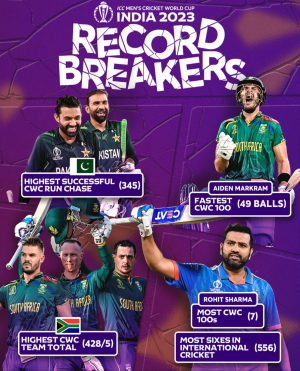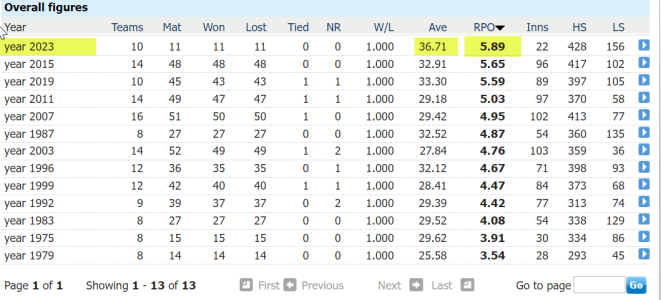The point is how are we so sure sure that this is because of the format? Because MCC and ECB tell us so? Does anybody remember the World T20 in Australia and how poorly Australia's last match against AFG was? Nobody even bothered to attend it despite the home side playing
The only buzz was for India matches and the knockouts.
Isn't it a great argument to just cull the World T20 instead of playing it every year? What justification exists to play WT20's every year or 2 years?
How can cricket fans get excited for a World Cup when there were 2 World T20's and 2 WTC finals in the last 2 years?
Was this the case in 1996 ?
Surely the amount of ICC cricket, meaningless Test matches and bilateral T20I's are just as big issues if not bigger issues.
Also, since 2019 the ICC have clearly prioritised WTC and World T20's and neglected ODIs completely.
Let's all be honest here. How many people attended England and New Zealand's Test tours of Pakistan in the stadiums? Any numbers on that?
On the other hand, I'm sure an ODI triangular between these teams would draw more crowds especially if something was at stake(WC qualifying points etc)
1)
Lack of buzz: Due to ODIs decline vs ICC event saturation ?
There were three ICC events in the three years leading up to the 2011 World Cup, including 2 T20 World Cups, yet it didn't reduce interest in that event. The difference now is T20 is far more established as a commercial entity and the undisputed #1 white-ball format whereas then ODIs still had value. Bilaterals in 2007-2011 weren't the joke they are now.
Look ICC events in close proximity doesn't help either but even without them the inherent flaws in ODI cricket remain. Forget the purists - why should an average viewer watch two white-ball formats when one delivers the same amount of action in half the duration, and a greater number of close contests/upsets ?
2)
Domestic List A cricket
Another sign of ODI's dwindling relevance is how domestic List A cricket not only rarely features the best players but doesn't consistently form the basis for ODI selection.
Haris Rauf debuted in ODIs primarily because of his T20 exploits. Same with Gus Atkinson and many other examples. Therefore if ODI selection is being determined by T20 performances - why shouldn't we just make T20 the sole white-ball format ?
3)
T20 World Cups
The T20 World Cup was only held in consecutive years in 2021 and 2022 because Covid delayed the former edition meant to be held in 2020. The 2022 edition many memorable contests from PAK-IND, ENG-IRE, PAK-ZIM, SA-NED and the various upsets in the qualifier. Admittedly the crowds were poor but the tournament wasn't being held during the peak of the Australian summer, and fans already saw Australia win the previous year. The crowds for ODIs vs ENG were even worse.
I agree every two years is too frequent, but culling the T20 World Cup is a nonstarter for non-Big 3 boards whose depend heavily on ICC revenue. Every time there's elections for ICC Chairman you'll have one candidate representing boards who want more ICC tournaments and another representing boards who still find bilaterals profitable. So whatever cricket structure we envision must account for cricket's political/economic realities
4)
Mapping the future
That last sentence is key - every match must have something at stake. This is a very rough sketch but how about:
- A WTC where each team plays each other once over a four year cycle ending in a final, split into two divisions. D1 consists of the top nine nations and D2 has IRE, AFG and ZIM. The 9th ranked team in D1 is replaced by the winner of D2. Due to its economic unviability but status as a legacy product, let each board determine the amount of Tests they can economically afford.
- A T20 World League that determines qualification for the T20 World Cup much like the ODI Super League to give bilateral T20s context.
- T20 World Cup every four years.
Anyway this debate can continue forever but think there's consensus we need more cricket of consequence and competitiveness.

 economictimes.indiatimes.com
economictimes.indiatimes.com











